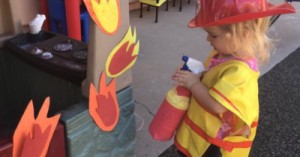Remembrance Day, observed on 11 November, honours those who served and sacrificed in war and peacekeeping efforts. While the concept of war may be too complex for toddlers and preschoolers, educators and families can introduce the day through gentle, symbolic, and emotionally resonant experiences.
Key Approaches:
- Use simple language to explain themes like peace, kindness, and gratitude.
- Focus on emotional literacy rather than historical detail—help children understand feelings like empathy and respect.
- Avoid graphic or violent imagery, instead centering on hope, remembrance, and connection.
Meaningful Activities
Group Time Activities
Peace Circle
- Light a candle or place a symbolic poppy in the centre.
- Invite children to share what kindness means to them.
- Use phrases like “We remember with love” or “We care for others.”
Gentle Storytime
- Read stories about helpers, community, or caring (e.g., Wilfrid Gordon McDonald Partridge).
- Use puppets or felt boards to retell stories with emotional warmth.
Music & Movement
- Sing calming songs like “Peace Like a River” or “I Am Special”.
- Use scarves or ribbons to move gently in a “peace parade.”
Sensory Play Ideas
Poppy Petal Tray
- Red and black playdough with poppy cutters or loose parts (buttons, felt, petals).
- Invite children to “plant” poppies in sand or soil trays.
Peace Potion Station
- Water play with calming scents (lavender, rose), flower petals, and scoops.
- Children mix “peace potions” to share with friends or place near a symbolic candle.
Thread of Kindness
- Use yarn, beads, or fabric scraps to create “kindness bracelets” or “peace chains.”
- Each child adds a piece while naming something kind they’ve done or felt.
Creative & Symbolic Crafts
- Fingerprint Poppies: Red fingerprints around a black centre on paper.
- Peace Doves: Trace hands to form wings, decorate with calming colours.
- Remembrance Garden: Collaborative mural with flowers, hearts, and messages of care.
Emotional Intelligence in Practice:
- Encourage children to express what peace means to them.
- Use reflective prompts like “How can we show kindness today?” or “What does remembering feel like?”
- Honour children’s voices and interpretations—there’s no one “right” way to commemorate.
Further Reading
Family Poppy Wreath
Remembrance Day Activities For Children
Remembrance Day Posters
Remembrance Day Poppy
Remembrance Day Poem
Peace In Our Hands







 Open ended questions cannot be responded to with one word answers such as yes or no. These types of questions enables a child to provide
Open ended questions cannot be responded to with one word answers such as yes or no. These types of questions enables a child to provide During your child’s preschool years, an important milestone begins to emerge. This is the development of pre-writing skills. Pre-writing skills are used to encourage, develop
During your child’s preschool years, an important milestone begins to emerge. This is the development of pre-writing skills. Pre-writing skills are used to encourage, develop Open ended materials enables children to play freely. They are objects that have no rules to follow, use or function. Raw materials that can be
Open ended materials enables children to play freely. They are objects that have no rules to follow, use or function. Raw materials that can be An Acknowledgment of the Country is a way of showing respect for the Traditional Owners and can be given by both non-Indigenous people and Aboriginal
An Acknowledgment of the Country is a way of showing respect for the Traditional Owners and can be given by both non-Indigenous people and Aboriginal Language plays an important role in a child’s development. It enables a child to communicate effectively with their family, learn at school, socialize with friends,
Language plays an important role in a child’s development. It enables a child to communicate effectively with their family, learn at school, socialize with friends, Like adults, children have to deal with their own stress in life. Moving house, starting a new school, preparing for a new sibling - these are
Like adults, children have to deal with their own stress in life. Moving house, starting a new school, preparing for a new sibling - these are Playdough is such a versatile material. It provides numerous benefits to children as they manipulate it, it is safe and soothing and provides children with
Playdough is such a versatile material. It provides numerous benefits to children as they manipulate it, it is safe and soothing and provides children with Teaching children about sustainability enables them to appreciate and respect the natural environment. Early childhood services can provide meaningful hand on learning experiences in order
Teaching children about sustainability enables them to appreciate and respect the natural environment. Early childhood services can provide meaningful hand on learning experiences in order Recycling is an important concept that teaches children to care for the environment. It encourages children to be responsible and show a growing appreciating for
Recycling is an important concept that teaches children to care for the environment. It encourages children to be responsible and show a growing appreciating for When children apply paint to paper, glue things together, or pound a lump of clay, they experiment with colour, shape design and texture.
When children apply paint to paper, glue things together, or pound a lump of clay, they experiment with colour, shape design and texture.



